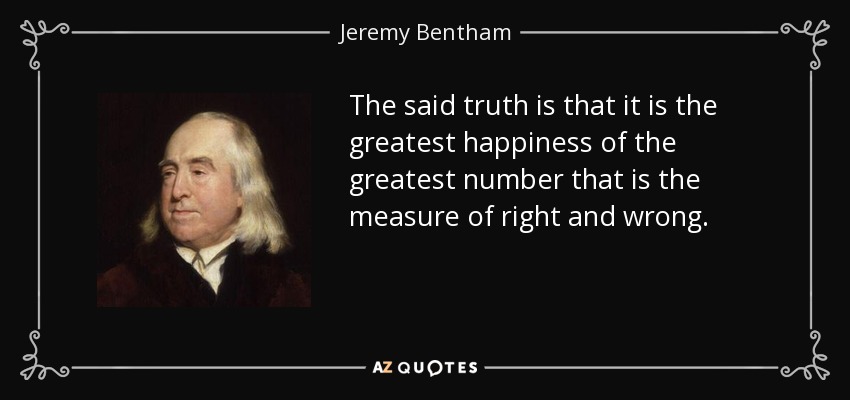 "There is a little morality in all good psychological reasoning."
"There is a little morality in all good psychological reasoning." Through the philosophy of psychology we learn that there are innate senses and emotional potentials in man, that become actuated by circumstances and events, and embedded into the mind's memory, forming the conscience or super-ego of individual moral agents.
Some pleasures and pains are subjective and personal but there are still those that are objective, normal, and as experience of all Human's: collectively. This collective morality becomes the global, national, states (tribal) "legal" power over the people, which it uses to condemn, imprison, and punish, those who infringe upon it. Economically, man is rewarded for his work and gains pleasure in his trade.
Hedonic calculus is a way of measuring what is moral or immoral, and should assist us when we inquire into our own desires and will, asking ourselves the questions that are relevant at that time and place, for those sets of circumstances.
Through the historical examination of ethical philosophy, we encounter a fiber of truth, that runs through the entire fabric of moral and psychological philosophy. It is in this history and in these philosophical terms that man can be lead to a more objective sense of morality. From the readings of Protagoras to the readings of the Utilitarians (to what was not covered in this blog: Positive Psychology); what you can learn from these philosophers is that morality is a common science, not a common myth. And that psychology is ever endowed with a mission to lead man to his best state, to find his own pleasures, and happiness in the world which he lives in and the world which he manipulates through his own agency.
The moral philosophy in the whole of this blog is insufficient. We now have access to the valuing of behaviors based on the impact of our decisions on the ecosystem, on economic factors, on the health of the body or preventing human illness, on defending scientific truth, on the national and global rights of human beings and other living organisms.
Some pleasures and pains are subjective and personal but there are still those that are objective, normal, and as experience of all Human's: collectively. This collective morality becomes the global, national, states (tribal) "legal" power over the people, which it uses to condemn, imprison, and punish, those who infringe upon it. Economically, man is rewarded for his work and gains pleasure in his trade.
Hedonic calculus is a way of measuring what is moral or immoral, and should assist us when we inquire into our own desires and will, asking ourselves the questions that are relevant at that time and place, for those sets of circumstances.
Through the historical examination of ethical philosophy, we encounter a fiber of truth, that runs through the entire fabric of moral and psychological philosophy. It is in this history and in these philosophical terms that man can be lead to a more objective sense of morality. From the readings of Protagoras to the readings of the Utilitarians (to what was not covered in this blog: Positive Psychology); what you can learn from these philosophers is that morality is a common science, not a common myth. And that psychology is ever endowed with a mission to lead man to his best state, to find his own pleasures, and happiness in the world which he lives in and the world which he manipulates through his own agency.
The moral philosophy in the whole of this blog is insufficient. We now have access to the valuing of behaviors based on the impact of our decisions on the ecosystem, on economic factors, on the health of the body or preventing human illness, on defending scientific truth, on the national and global rights of human beings and other living organisms.
